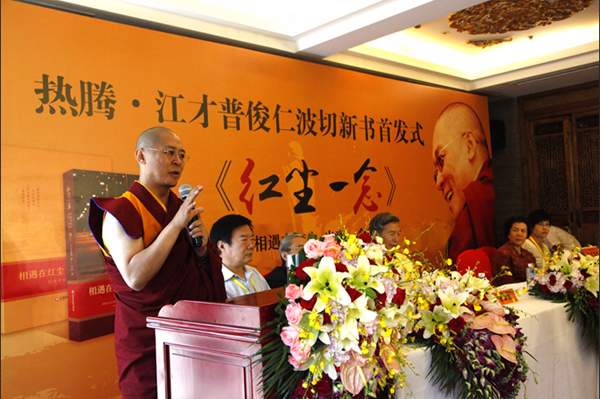Living Buddha talks on life and death in dialectic visions
- By Wu Jin
 0 Comment(s)
0 Comment(s) Print
Print E-mail China.org.cn, July 7, 2017
E-mail China.org.cn, July 7, 2017
|
|
|
Jiangcaipujun Renboqie gives a speech at the launching ceremony of his new book on June 15 in Beijing. [Photo/Xinhua] |
According to Jiangcaipujun Renboqie, the 15th Living Buddha in Yushu Tibetan Autonomous Prefecture, Qinghai Province, "The purpose of a journey is to return to the starting point, where we were accompanied by our mothers in childhood helping to shape our minds as to why we come into this world."
He made the remark recently while being interviewed in Beijing by several media outlets seeking to explore the Living Buddha's wisdom and vision on life and death, departure and reunion, victories and defeats and nobility and humility that reflect the heart and soul of humankind.
"Tibetans consider that successful people are those who have understood why they were born into this world," the Living Buddha said.
No matter how capricious the world may be, the fundamental spirit never changes, he emphasized.
Dedicated to a life as a Living Buddha since his birth in 1981, Renboqie shares many chic hobbies, such as drinking coffee, watching National Basketball Association (NBA) games and posting articles on Weibo and Wechat for discussion with his contemporaries growing up during the inception of China's reform and opening up.
He received his education from Beijing Foreign Studies University, High-level Tibetan Buddhism College of China, Department of Philosophy and Religious Studies and the Department of Psychology of Peking University. He also spent some time abroad where he learned to speak and write in English.
Last month, his book "Practice and Enlightenment - The Buddha Way in a World of Impermanence" written both in Chinese and English reflecting his mental processes, views and visions, was published and he donated all the sales income to the operation of Retengrenboqie Monastery, where he is based, as well as charity houses and nursing homes for seniors.
However, behind this luminous and privileged background and experiences, he retains a humble mind that he says enables him to avoid arrogance and look at himself truly and peacefully at all times.
"Except for my Buddhist robe, I am no different from people in the secular world," he explained.
He recalled his experience as a penniless monk traveling to Beijing in his early 20s, where he shared berths with migrant workers totaling more than 40 people in one room.
To this day, he continues to regard himself as a vagabond monk than a privileged master whose soul would soon be lost in fame and fortune.
However, this simplicity in life and a modest mind have not diminished his power to do some extraordinary things for his hometown. He has hosted motorcycle races and philanthropic fairs in the prefecture where the headwaters of the Yellow River, cradle of Chinese civilization, begin the long journey to the sea.
He recalled the day when some wealthy donors from cities came to the prefecture to meet the local Tibetan beneficiaries, who he advised should to help wash the feet of the latter.
Since the water resources are rare in plateau, the local residents rarely wash their feet. Afraid that the visitors might be offended by their smelly feet, the locals protested strongly when the philanthropists managed to take off their socks. However, the donors insisted and once they had touched the bare feet and put them in water, the Tibetans pressed their hands onto the visitors' noses in blessing.
That broke the ice and a close relationship soon developed so that, when it was time for parting, the two sides cried uncontrollably.
"This is something about the feeling of the heart that can surmount language barriers and the differences between ethnic groups," he said.
The Yushu Tibetan Autonomous Region underwent a devastating 7.1-magnitude earthquake and a string of aftershocks in 2010. Likewise, several days ahead of the interview with Renboqie, a landslide in Maoxian County of Sichuan Province was feared to have claimed over 100 lives of the people buried under mud and rocks.
Facing the topic of life and death, the Living Buddha said, people will always be shocked by unexpected disasters.
In addition to mourning, chanting and praying for the deceased, Renboqie also gives his views, saying, those remaining in the world should always cherish each moment while they are still living.
"Anything could happen at any moment. No matter how unwilling we are, the day we bid farewell to the world will come and must come," he said.







Go to Forum >>0 Comment(s)